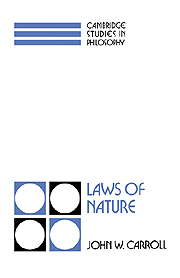Chapter 6 - The limits of inquiry
Published online by Cambridge University Press: 12 January 2010
Summary
The arguments of Chapters 1 through 5 establish that lawhood and causation are subject to principles that, in a certain obvious respect, are perfectly parallel:
The Nonsupervenience of Lawhood. There are at least two possible worlds agreeing on the nonnomic concepts instantiated by some proposition P and disagreeing on whether P is a law.
The Independence of Causation. There are at least two possible worlds agreeing on the noncausal concepts instantiated by two states of affairs P and Q, and disagreeing on whether P causes Q.
In expressing these parallel doctrines, I employ some specialized terminology with which the reader, by now, should be familiar: The nomic concepts are the concepts with direct and obvious connections with lawhood. Key examples of the nomic concepts include lawhood itself, causation, and counterfactual dependence. The causal concepts are the nomic concepts with extremely direct and very obvious connections with causation. They are pretty much exhausted by causation itself and (causal) explanation.
Despite my arguments, I am sure that some remain unconvinced. Why is that? Stubbornness and other obviously objectionable reasons aside, I suspect that one minor obstacle is a concern stemming from a thesis I call the supremacy of science. It maintains that science will in a certain sense be complete – that scientists will discover or, in some strong sense of ‘capable’, are capable of discovering every fact there is.
- Type
- Chapter
- Information
- Laws of Nature , pp. 150 - 160Publisher: Cambridge University PressPrint publication year: 1994



